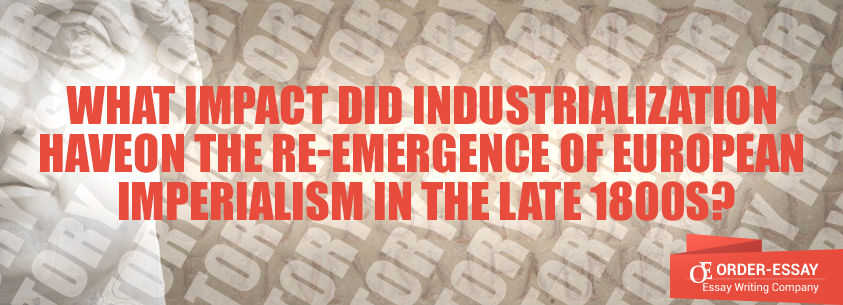
From the sixteenth century on, the European countries engaged in building colonies around the world. The impact of imperialism on economic features of the nations worldwide was and continues to be so considerable that historians never stop debating its reasons, causes, and consequences. To understand the world’s complex economic relationships, it is useful to analyze the forces, which brought imperialism to life. It should be noted though that all of the empires fell by the end of the twentieth century. This paper will focus on the new wave of European imperialism in the late 1800s, which was triggered by the process of industrialization.
The new phase of territorial expansion that lasted from 1880 up to 1938 was marked by the enormous scale of colonial encroachment. During this period, old and new European empires (and also Japan and the U. S.) expanded to unbelievable dimensions. The stimulus that invoked such reaction was the Industrial Revolution of the late nineteenth century. Industrialization caused that revolution enabled the powerful and rich countries to acquire strong military forces and dominate other weaker nations by utilizing weapons and power. Apparently, this became the motive of imperialistic aspirations of the European nations. Furthermore, industrialization created a demand for raw materials and new markets for selling their produced goods, while both could be satisfied by using the advantages of new territories.
Need custom written paper? We'll write an essay from scratch according to your instructions!
Plagiarism and AI Free
Price from only 10.99$/page
Call Now
Start Chat
Order Now
To understand the cause-and-effect relations between industrialization and imperialism, it seems necessary to consider the phenomenon of the Industrial Revolution in detail. Thus, its breakthrough was the invention of a new effective way of moving machines; thus, people learned how to do it by burning fuels. In such a way, a steam engine became the most important invention of humanity and changed the lives of people and nations forever. It is interesting to note that though Britain had for long been an unsurpassable leader in economic progress and power, around 1870, Germany came onto the stage of the world’s development. It became a leader in European industry owing to its large-scale production of chemicals and electrical equipment. The country engaged in enlarging its trade networks and managed to build large numbers of new plants and factories. Overall, the growth in industry and transportation as well as increased trade between nations stimulated the formation of the world economy, which, in its turn, is directly linked with imperialism.
On the one hand, such enormous progress may seem completely positive and productive. Indeed, people had been making all products by hand, slowly and in small quantities. Now that machines were made and factories built, goods production became quick and cheaper. Undoubtedly, trains and ships with steam engines were without any doubt faster and not so expensive. New technologies were first introduced in England’s textiles mills at the end of the eighteenth century. Throughout the whole nineteenth century, the technological revolution spread over the rest of Western countries. It is reasonable to assume that with such new powers, the quickly developed nations received new opportunities to influence and take advantage of the less developed countries. It should not be forgotten though that industrialization had adverse impacts on people in European societies. Since flourishing factories could produce goods quicker and cheaper than hand labor, many professionals lost their jobs and consequently means for survival, which was especially true for craftspeople. In addition, the demand for huge numbers of people to work at factories caused uncontrolled migrations of countryside inhabitants since they came to the cities, overcrowding them. As a result, there were unsanitary living conditions, low wages, and long working hours. The hard labor of small children during this historic period was reflected exuberantly in the literature if to mention, at least, the stories by Charles Dickens describing horrible scenes from the lives of children working in factories for sixteen hours a day.



Thus, with all its positive and negative aspects, industrialization had an effect on the new wave of imperialism and colonization. Before the Industrial Revolution, during the 1800s up to 1870, the Western nations engaged in trade and political affairs with Asian and African countries. However, between 1870 and 1900, Europeans expanded the colonization of these territories tremendously using powerful weapons and iron warships. Gradually, imperialism spread throughout the world reinforced by the competition between the Western powers. Thus, in 1800, they dominated 35 per cent of the whole world, and by 1914, it totaled 84 per cent. Industrialization enabled the European countries to seize control over the resources and markets of the colonies directly, without trade or political relationships. Therefore, they received considerable benefits from Asian and African lands, including material resources such as oil, tin, gold, or diamonds. More particularly, Portugal, France, Britain, Belgium, Spain, and Germany made colonies in Africa. In addition, the British, Dutch, Russians, French, and Portuguese colonized territories in Asia. It is worth noting that very often, the Western powers were so seized by the spirit of competition among them that they strived to establish colonies simply to show their strength and might. The colonization process reached unparalleled proliferation, even though having colonies did not always add to the benefits of the empire. In fact, it was not so easy to maintain them and fight the frequent rebellions for independence, which took place in the colonized territories.
Get a Price Quote
To sum, no one would argue the significance of these two described processes, namely industrialization and imperialism. Both of them played an outstanding role in the history of the whole world. They were considered in interrelation and their reasons and motives, effects and consequences were discussed. In the end, both industrialization of the late 1800s and the following new wave of imperialism distinguished to a considerable degree the shape of the present-day world, global economy and politics.








